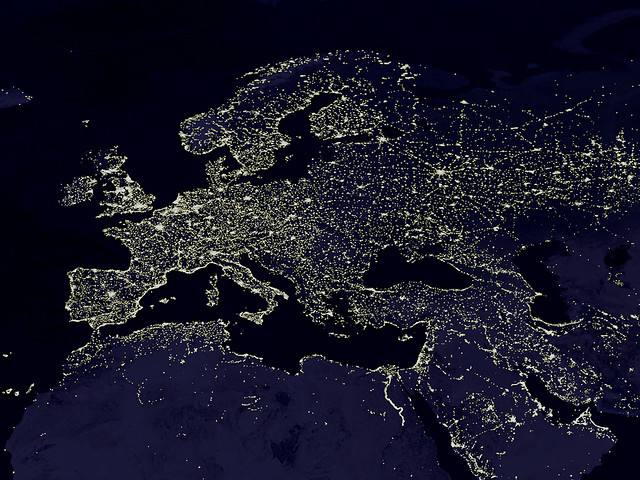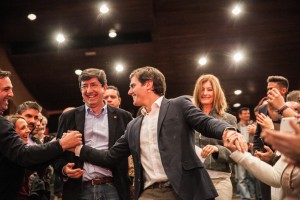By David Held and Kyle McNally
It has been a tough year for Europe. Greece, mass migration and terrorism are among the many factors which have unsettled Europe in a profound way. When the EU is seen to stutter and stumble from one crisis to another, what the EU stands for, and what the EU is all about, are questions that become of great significance. Perhaps it is just an end of year reflection, but there does seem to be something profoundly cumulative about the pressures on the EU.
Empires fall, countries collapse, and regimes break when they come under multiple pressures which pile on difficulties of growing complexity. When this complexity outstrips the steering capacity of such entities they tend to crumble and give way to new historical forms. Is the EU now in this position?
Steering capacity comprises a number of different things. It requires having the governance mechanisms to resolve pressing problems, and the cultural and symbolic goods which bind a population together. In the case of the European Union, its governance mechanisms have typically been well adapted to a world of rising prosperity. The postwar boom assisted Europe’s development such that all countries could rise simultaneously.
The European community was, moreover, bound together in the postwar years because of two crucial social and symbolic experiences. The first of these was the Second World War and its catastrophic legacy. The second was the Cold War which gave Europe a strong sense of negative integration. But when the Cold War came to an end and the threat of the Soviet Union was over, what would bind Europe into the future? In the 1990s and early 2000s, faced with mounting economic and social difficulties, the EU needed positive ideals and norms of integration, such as commitments to social justice, sustainability and well-being, which were too often either latent or absent.


 First and foremost among this latter group was Pablo Iglesias, a political science lecturer who would become the main leader of the party. The new party combined the innovative populist discourse of Iglesias, aimed at transcending the old left-right ideological divides by giving voice to all those who had been severely hit by the economic crisis, with a new emphasis on democratic and bottom-up politics, using social communication technologies. These procedures allowed all sympathisers to nominate the candidates for the European Parliament elections in a completely open primary.
First and foremost among this latter group was Pablo Iglesias, a political science lecturer who would become the main leader of the party. The new party combined the innovative populist discourse of Iglesias, aimed at transcending the old left-right ideological divides by giving voice to all those who had been severely hit by the economic crisis, with a new emphasis on democratic and bottom-up politics, using social communication technologies. These procedures allowed all sympathisers to nominate the candidates for the European Parliament elections in a completely open primary. During the first part of their mandate, the government implemented a highly contested economic adjustment package that belied some of their electoral promises (such as raising taxes), and was forced to request from the EU a rescue plan to clean up the Spanish banking system. In the later period in government, the PP reversed some of their most unpopular and conservative policies. Some tax cuts were introduced, and a controversial bill to restrict abortion was dropped. The economy has finally showed signs of recovery, and is presently growing at a rate of 3.4 per cent, the highest in the euro area. Unemployment has also fallen sharply from its peak of 26 per cent in early 2013 to 22.5 per cent in mid-2015.
During the first part of their mandate, the government implemented a highly contested economic adjustment package that belied some of their electoral promises (such as raising taxes), and was forced to request from the EU a rescue plan to clean up the Spanish banking system. In the later period in government, the PP reversed some of their most unpopular and conservative policies. Some tax cuts were introduced, and a controversial bill to restrict abortion was dropped. The economy has finally showed signs of recovery, and is presently growing at a rate of 3.4 per cent, the highest in the euro area. Unemployment has also fallen sharply from its peak of 26 per cent in early 2013 to 22.5 per cent in mid-2015. In office longer than any other political party since the transition from dictatorship to democracy – twenty-one years – the PSOE has struggled to formulate a convincing narrative which goes beyond reminding voters of its many undoubted achievements under both Felipe González, most particularly the development of a welfare state underpinned by historic economic modernisation, and Zapatero, whose period in office (prior to the economic downturn of 2008) witnessed the introduction of wide-ranging progressive social legislation which characterised Spain as one of the continent’s most advanced countries.
In office longer than any other political party since the transition from dictatorship to democracy – twenty-one years – the PSOE has struggled to formulate a convincing narrative which goes beyond reminding voters of its many undoubted achievements under both Felipe González, most particularly the development of a welfare state underpinned by historic economic modernisation, and Zapatero, whose period in office (prior to the economic downturn of 2008) witnessed the introduction of wide-ranging progressive social legislation which characterised Spain as one of the continent’s most advanced countries.
 In late spring 2008, the CEO of Air Berlin Joachim Hunold said
In late spring 2008, the CEO of Air Berlin Joachim Hunold said 




